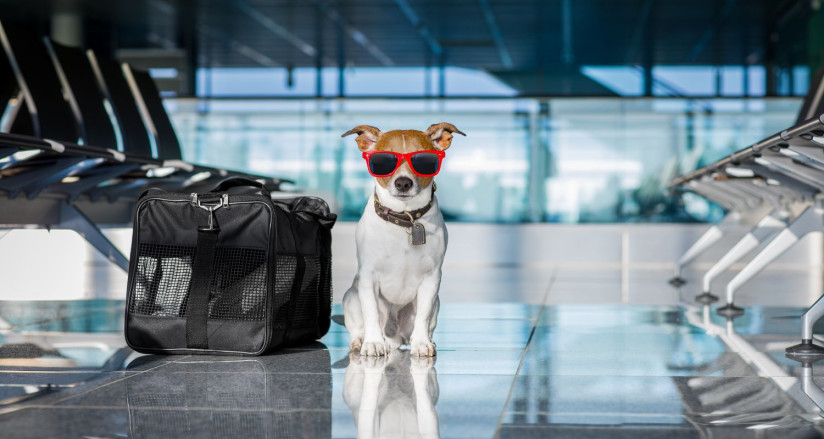How to Travel Safely with Your Dog
Embarking on a summer adventure with your furry companion? Summer is a great season to get outside with your dog. However, traveling with a pet requires planning and consideration for a safe and enjoyable experience. No matter how you are getting to your destination, here are some tips to consider for a stress free journey.
Getting Your Dog Ready for Travel
- Schedule a vet check before you travel. Your vet can confirm whether your dog is healthy enough for the trip and provide any necessary advice or medications. Be sure to bring a copy of your dog’s medical records in case you need to visit a vet while you're away.
- Make sure your dog has proper ID. Attach a sturdy, easy-to-read ID tag with your contact information to their collar. This is often the first thing someone will check if your dog gets lost. For extra security, consider having your dog microchipped, which provides a permanent, scannable form of identification.
- Pack a supply of your dog’s usual food with you. A vacation is not the time to change up their diet! Check in advance if your dog’s food is available at your destination in case you need to restock.
Dog Travel Essentials: Carriers, Medications and Feeding Tips
- Always keep your dog safely confined during travel. Whether you're driving, flying, or using public transportation, the best way to protect your dog is by keeping them in a secured kennel or carrier—or on a leash if they’re outside the carrier.
- Carry recent photos of your dog. A recent photo will help identify your pet in case they get lost.
- Consult with your veterinarian about appropriate medicines or natural sedatives. Your vet can best advise you about safe and appropriate medicines for your specific mode of transportation, especially if your dog is predisposed to anxiety or motion sickness.
- Feed your dog before traveling. Give your pet their usual meal one to two hours before travel (or two to four hours before if they are prone to motion sickness), and bring along familiar toys, chew items, or a favorite blanket for comfort.
Dog Safety in Cars: Why Restraints and Frequent Breaks Matter
Always restrain your dog when traveling by car, no matter the distance. An unrestrained dog can be seriously injured in a sudden stop or by road debris—especially if riding with their head out the window. For safety, secure your dog in the back seat using a pet travel harness, car seat, or a carrier strapped in with a seatbelt. If you're driving a pickup truck, use a crate or carrier that’s securely fastened to the truck bed.
Exercise helps relieve stress. Schedule time before you leave and after you arrive at your destination. Take breaks for potty and play along the way (about every four hours) and be sure to use a leash, as even the most obedient of pets can become disoriented during travel and react unusually.
Last, be mindful of temperature – extreme hot or cold in a car is just as harmful for dogs as it is for humans.
Flying or Riding the Train Safely with Your Dog
- Buy an airline or train line-approved carrier. Your dog will need one whether they join you in the cabin or travel in the cargo hold. Check the airline or train line website for requirements. Carriers may also require health or immunization records or other information.
- Book direct flights. It is easier to avoid mix-ups during transfers or possible delays in getting your pet off the plane. Ask the airline if you can watch your pet being loaded and unloaded from the cargo hold.
- Open the carrier as soon as you are in a safe place at your destination. Clip a leash on your dog so you can safely examine them. See a veterinarian immediately if you notice anything wrong.
Choosing the Right Hotel for Traveling with Your Dog
Not every hotel is pet-friendly, so be sure to research pro-pet chains in advance. Best Western, DoubleTree, Choice Hotels, Marriott, Four Seasons, and more allow dogs. There may be charges, extra fees, or deposits if your pet will be joining you for a stay.
Helping Your Dog Overcome Motion Sickness and Car Anxiety
Be alert for signs of motion sickness. These can include human-like symptoms, such as vomiting and dry heaving, as well as more dog oriented ones, like excessive lip-licking, panting, shaking, and inactivity. Puppies are especially prone to motion sickness because their inner ear structures—which help with balance—may not be fully developed yet. Fortunately, most outgrow it as they mature.
These symptoms can also indicate stress. Dogs of any age may associate car rides with past trauma—such as being abandoned or getting sick as a puppy. This negative association can cause ongoing anxiety that needs to be gently addressed over time.
Conditional training is the best way to reduce your dog’s car anxiety. Begin with short sessions sitting in the car with the engine off. Use calming activities—like feeding treats, giving a favorite chew toy, or gentle brushing—to create positive associations with the car.
Gradually increase your dog’s exposure to the car. Start by sitting in the stationary car, then progress to sitting with the engine running. Next, take short trips around the block or to places your dog enjoys, like their favorite park. Over time, you can introduce longer trips and new destinations.
Helping Your Dog Settle In After Traveling
Let your dog explore. Show them their new accommodations and where they can find their food and water. Be sure to take them for a walk around where you are staying to familiarize them with their surroundings.
Check your pet-friendly hotel’s policy on leaving your pet alone in the hotel room. Some may specify that this is not allowed, and you will be held responsible for any damages to the room caused by your dog.
